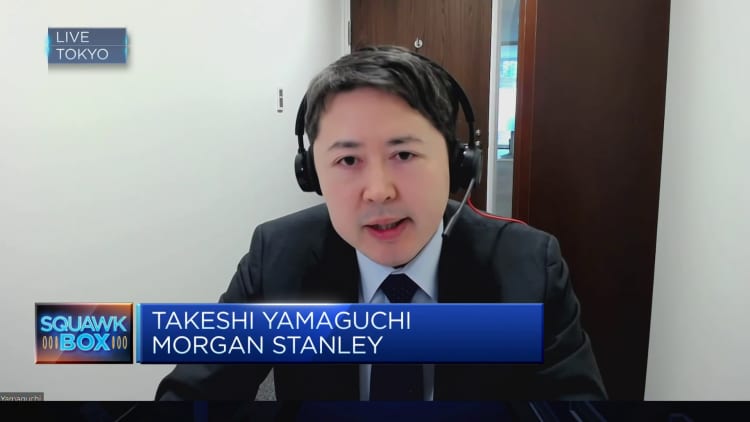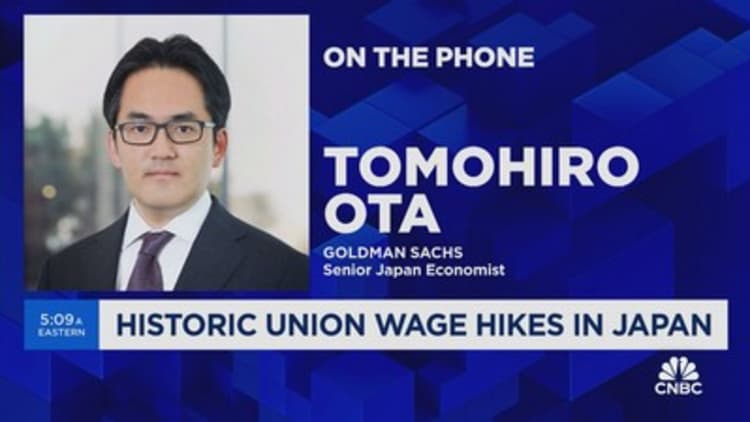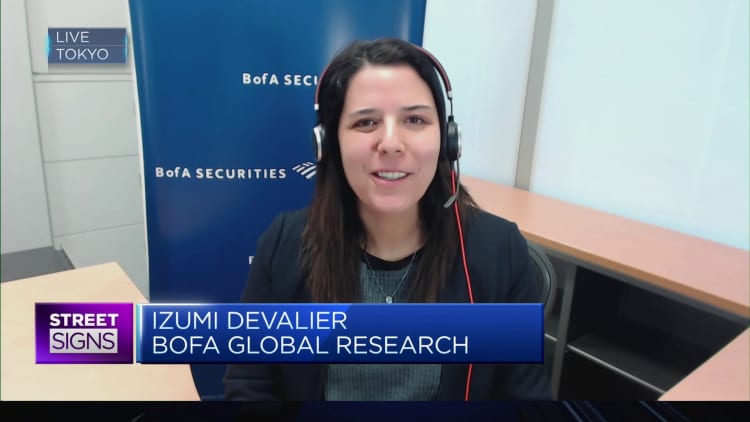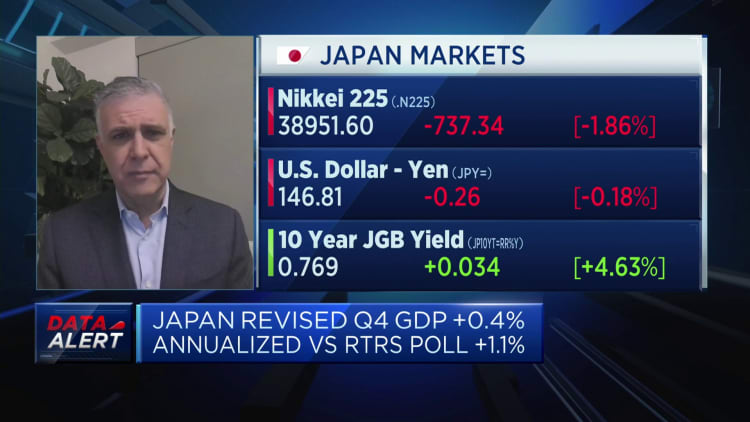[ad_1]
Akihiko Matsuura, president of UA Zensen, second left, raises his fist with members of the union throughout a rally for the annual wage negotiations in Tokyo, Japan, on Thursday, March 7, 2024.
Kiyoshi Ota | Bloomberg | Getty Pictures
Japan’s largest federation of commerce union, Rengo, on Friday stated that staff on the nation’s largest corporations are set for the sharpest wage spike in additional than three many years, setting the stage for the central financial institution to exit the world’s final unfavourable charges regime.
Rengo stated its seven million members are poised to obtain about 5.28% in wage increments in fiscal 12 months 2024, based on the primary of its a number of provisional tabulation of this 12 months’s negotiations at its numerous constituent unions.
The world’s largest automaker Toyota on Wednesday had agreed to the largest annual pay enhance for staff in 25 years.
Market hypothesis reached a fever pitch this week as numerous company giants introduced sturdy wage increments, in some situations exceeding the unions’ calls for.
The rally in Japanese equities has stalled, with the yen strengthening in opposition to the greenback and 10-year Japanese authorities bond yields hitting their highest in three months.
There are expectations the Financial institution of Japan might hike charges for the primary time since 2007 at its coverage assembly subsequent week â as a substitute of ready till its April assembly â whereas additionally exiting unfavourable charges.
Financial institution of Japan Governor Kazuo Ueda has repeatedly stated the result of this 12 months’s wage negotiations will affect the central financial institution’s resolution on when to exit the world’s final unfavourable rate of interest coverage.

Although “core core inflation” â which excludes meals and power costs â has exceeded its 2% goal for greater than a 12 months, the BOJ has barely budged from its present ultra-accommodative financial coverage posture that has been in place since 2016.
The BOJ’s pondering is that elevated wages will stimulate shopper spending, lifting costs in a sustainable method, and permitting extra room for financial tightening.Â
This is what you must find out about this 12 months’s spring wage talks, which takes place yearly in March.
What’s occurred to date?
On the annual wage talks, administration and unions of main corporations throughout industries meet for negotiations to assist decide staff’ pay and dealing circumstances for the brand new fiscal 12 months beginning in April.
The majority of the “shunto” talks concluded Wednesday, with many giant Japanese corporations similar to automakers Honda Motor, Nissan Motor, and electronics producer Panasonic acceding to their unionized staff’ requests.

In keeping with a Goldman Sachs tally of wage negotiations concluded to date, two of Japan’s largest metal corporations agreed to giant wage will increase that exceeded union expectations â Nippon Metal agreed to 14.2% in wage increments, whereas Kobe Metal agreed to 12.8%.
Japan’s largest commerce union grouping, also referred to as Rengo, stated earlier this week staff at main Japanese corporations have requested for annual will increase of 5.85%.
That is far larger than the 2023 enhance of greater than 3%, which had been the very best in about three many years.
It marks a big breakthrough in Japan, the place actual wages have stagnated since a banking disaster within the Nineteen Nineties.
Why does it matter?Â
The Financial institution of Japan has pursued a coverage of aggressive financial easing in an try to stimulate costs after Japan fell into deflation and extended financial stagnation. Nevertheless, the nation has struggled to shake off attitudes surrounding stagnant wages.
Japan’s cultural give attention to job safety above larger pay is usually blamed for stagnant wages.

Virtually a 3rd of Japan’s workforce was engaged in part-time employment â usually seen as a drag on wages â in January, based on the newest information from the nation’s Ministry of Well being, Labor and Welfare.
In the meantime, Japan’s headline inflation averaged 3.2% final 12 months, but it surely slowed to 2.2% in January.Â
There have additionally been indicators that the latest inflation has crimped home demand and personal consumption in Japan.
Japan’s financial system averted a technical recession final week, bolstered by sturdy capital expenditure. Nevertheless, non-public consumption fell 0.3% quarter on quarter â greater than the provisional estimate of a 0.2% decline.
What’s forward?
Whereas Japan’s giant companies have the capability to accede to a wage bonanza given their report income, all eyes can be on the small and medium companies â which account for as much as 70% of jobs on the earth’s fourth-largest financial system.
If main unions had been capable of get wage will increase to about 5%, it could be sufficient to fulfill the BOJ that wages are rising and immediate them to shift financial coverage, Thierry Wizman, world rates of interest and currencies strategist at Macquarie Group, informed CNBC Monday.

Wizman stated the change in coverage would happen throughout the financial institution’s April assembly, however stated that “threat has shifted to a March shift in coverage.”
In the meantime, Goldman Sachs economists led by Tomohiro Ota wrote in a Tuesday word that they nonetheless consider the BOJ will terminate unfavourable rates of interest in April.
“Whereas a March price hike can’t be dominated out, we consider that the BOJ’s communications at this juncture should not clear sufficient to justify assuming the March hike as the bottom case state of affairs,” they wrote.
[ad_2]





